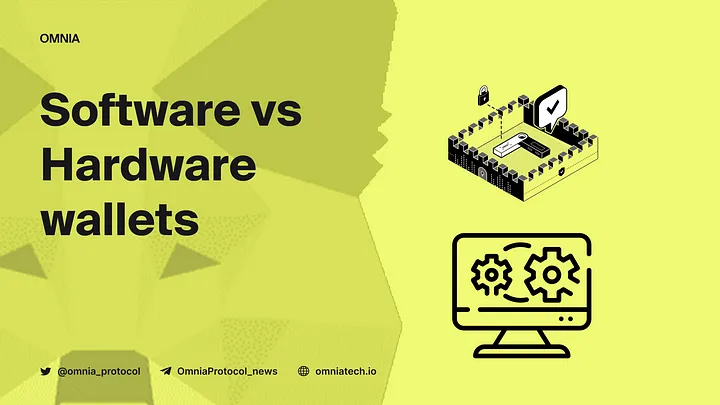
Software vs. Hardware Wallets
Two to three decades ago, the term wallet was synonymous with a leather pouch or bag that fits in the palm of your hand and pocket. Such a wallet was used to store physical money and identification documents. However, the internet and the launch of Bitcoin in 2009 and Ethereum in 2015 have resulted in the birth of cryptocurrency wallets.
What is a Crypto Wallet?
A cryptocurrency wallet is an app or physical device that allows users to store, retrieve, send and receive their digital assets. Crypto wallets can further be categorized into software and hardware wallets.
1. Software Wallet (also known as Soft Wallet or Hot Wallet)
As the name suggests, software wallets exist in the form of programmable applications that can be accessed on mobile phones, tablets, and desktop computers. Software wallets usually provide their users with private keys that further safeguard access to their digital assets.
A private key is usually a randomly generated number or sequence of letters that allow only the owner of the software wallet to access and manage the funds stored within.
Software wallets are often known as hot wallets, for they are always connected to the internet. Examples of software wallets include MetaMask, Trust Wallet, BlockWallet, MyEtherWallet, and imToken, to name a few.
To note is that cryptocurrency wallets such as those available through crypto exchanges such as Binance and Coinbase also fall into this category of software wallets. But, these crypto exchanges do not provide their users with private keys, which remain with the respective exchange. Users only get to secure their digital assets using passwords and two-factor authentication on the trading platform.
a. Advantages of software wallet solutions by crypto exchanges
The simple nature of software wallets, such as those provided by crypto exchanges, can have some benefits such as:
- Ease of use, especially when you are a frequent trader and use cryptocurrencies for day-to-day conversions into fiat and vis versa.
- They provide quick access in the scenario you need to liquidate your assets during a market crash such as the one caused by TerraUSD (UST) depegging from the $1 mark.
- The crypto exchanges can cover lost funds in the case of a hack. For example, Binance has a SAFU Insurance fund valued at $1 billion. The funds are meant to cover losses by its users during a security breach.
b. Advantages of self-custody software wallets
On the other hand, security breaches on crypto exchanges do happen, as was the case with KuCoin in 2020, when hackers drained $275 million worth of digital assets from the platform. In such a scenario, user funds and private keys were entrusted with the exchange.
Such a security breach exposes the vulnerability of soft wallets by crypto exchanges in that users do not have access to their private keys.
Therefore, self-custody wallets such as MetaMask, MyEtherWallet, and BlockWallet become attractive to users who want more control over their digital asset investments. Such control is why such wallets are referred to as ‘non-custodial’ software wallets and offer the following benefits.
- Reliability – soft wallets such as MetaMask and BlockWallet have been time-tested. Potential vulnerabilities have been assessed and rectified.
- Such soft wallets have additional web browser extensions that increase the efficiency of online transactions.
- They are also free to use and easy to set up.
- Non-custodial software wallets support multiple chains and decentralized applications. Additionally, software wallets have cross-asset bridges to other chains beyond Ethereum, such as the Binance Smart Chain and Tron.
- The code for such software wallets is also open-source. Developers and community members have access to the source code and can test and inspect it for vulnerabilities.
- Some wallets, such as MetaMask, allow users to change the default connection to the blockchain with a more secure one, such as the OMNIA Protocol.
- Self-custody wallets such as BlockWallet, are built with user privacy in mind. As a result, users can interact anonymously on the Ethereum network without fear of their metadata leaking.
c. Disadvantages of software wallets (self-custody and custodial)
Whether self-custody or through a third party such as crypto exchanges, software wallets also have the following disadvantages.
- Owners of both types of software wallets can be vulnerable to phishing attacks that result in the theft of private keys and passwords.
- Users of custodial wallets such as those by crypto exchanges can become victims of SIM swaps, resulting in unauthorized access and draining of the accounts.
- If a crypto exchange goes bankrupt, such as QuadrigaCX, funds stored on the platform are no longer accessible and are considered lost forever.
- In the case of sanctions, such as those facing Russia, crypto users from specific regions and countries are locked out of their accounts.
- Storing private keys to software wallets on computers and mobile devices is also risky. Such hardware devices can abruptly stop working due to viruses or hardware failure. They can also be stolen unexpectedly.
- Recovery phrases can also get lost. (A recovery phrase or seed phrase is a series of words, usually 12 or 24 in number, randomly generated by the crypto wallet that gives you access to the digital assets stored within.)
2. Hardware Wallet (also known as Cold Wallet/Storage)
Conversely, hardware wallets are physical devices used to store digital assets. Hardware wallets are often called cold wallets because users have to physically connect the wallets to their computers to start transacting their crypto-assets. They can also unplug their devices from the internet immediately after completing their transactions hence storing their funds offline.
Furthermore, owners of hardware wallets have complete control of their digital assets as they have the respective private keys and an additional PIN or password to access the device.
Examples of hardware wallets include Ledger, Trezor, SafePal, and D’CENT. Some crypto enthusiasts have even created hardware wallets at home, but for security reasons, purchasing from a known crypto wallet company is recommended.
a. Advantages of Hardware wallets
Regarding benefits, hardware wallets might be the preferred choice for many crypto users for the following reasons.
- The private key is kept within the hardware wallet, reducing the risks of storing it directly on the computer.
- The additional PIN encryption makes such devices more secure.
- Hardware wallets are also designed to hold multiple digital assets that belong to different blockchain networks.
- Such hardware wallets are immune to computer viruses (at least for now).
- All transactions are verified through the hardware wallet and not online on the computer.
- The code running the wallets is usually open-source, thus increasing transparency and accessibility to developers who can audit the code.
- The respective teams behind hardware wallets are constantly working to improve their code. For example, the team at Ledger has white-hack hackers who are consistently improving the security of their devices.
- Soft wallets also support some hardware wallets. For example, Blockwallet is working on integrating support for hardware wallets such as Trezor and Ledger.
b. Disadvantages of hardware wallets
Despite the advantages highlighted above, hardware wallets do have the following drawbacks.
- They are somewhat expensive and may be overlooked by crypto users who would prefer to use the money to buy more of their favorite digital assets -a Trezor and Ledger Nano X currently retail at approximately $85 and $149.
- Hardware wallets can be vulnerable to hacks through power glitching, side-chain attacks, and attacking the software at the core of the device (the Hardware Security Module or HSM)
- Owners of hardware wallets can be the victims of phishing attacks, as is the case with Ledger users after the July 2020 data breach of the company. The breach exposed over 1 million customer details (names, phone numbers, home addresses, and emails). As a result, potential hackers have continually sent fake emails or hardware wallet devices to Ledger customers, hoping to steal recovery seed phrases and their digital assets.
- The high cost of genuine hardware wallets might encourage crypto users to attempt to find discounts online, leading to the purchase of replicas or even tampered devices aimed at stealing seed phrases.
- Digital assets in hardware wallets are not immediately accessible during a market crash. The time spent hooking up a wallet to a computer could translate to further losses when selling.
Which is Better? Software or Hardware Wallet
The pros and cons of software and hardware wallets highlighted above bring us to the all-important question of which is better. The answer to this question depends on several factors, such as the value of the cryptocurrency being stored, whether the crypto is a long-term investment, or if the owner of the funds is a regular crypto user.
Firstly, a hardware wallet is recommended if the crypto being stored is valued in the thousands, hundreds of thousands, or even millions of dollars. The same applies to a long-term investor who believes in the vision of a particular crypto project and is willing to hold for multiple years. For example, a firm believer in Bitcoin or Ethereum can opt to store their BTC or ETH in cold storage.
Secondly, a day trader would benefit from having their funds in a custodial wallet on a crypto exchange. This will, in turn, allow them to access their funds quickly to set buy and sell orders according to their technical analysis. Once significant profits are made, the trader can consider storing a portion of the gains in a hardware wallet.
Thirdly, a regular user of DeFi services such as staking, yield farming, token swapping, trading on DEXs such as Uniswap, and buying NFTs might prefer using a software wallet such as BlockWallet or MetaMask.
Fourthly, a mix of both hardware and software wallets might be ideal. A certain percentage of digital assets can be stored in cold storage. Another portion on self-custody software wallets to participate in DeFi, and another share on crypto exchanges to participate in regular day or swing trading.
Conclusion
Summing it up, the main difference between a software and hardware wallet is that one is purely a programmable application for the storage of crypto, and the other is a physical device to accomplish the same goal.
Both software and hardware wallets have advantages and disadvantages that should be considered before using one. A software wallet is ideal for crypto users who want quick access to their funds to participate in trading, DeFi, or fiat-to-crypto conversions. On the other hand, a hardware wallet is ideal for storing large amounts of digital assets, particularly those kept as long-term investments.
Alternatively, the combined use of software and hardware wallets might be ideal to capitalize on all their benefits.


